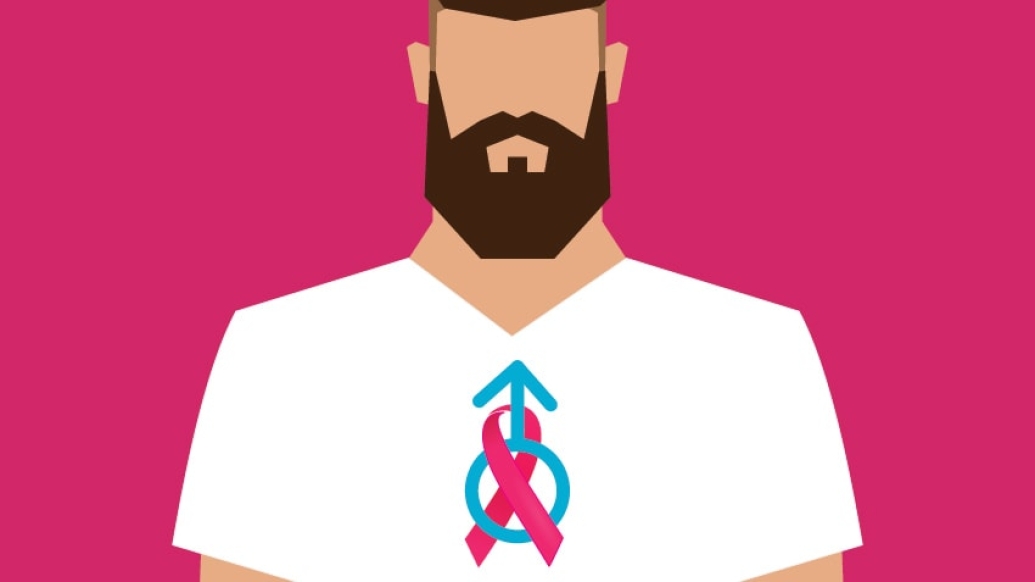Everyone knows women face a risk of developing breast cancer. Although far rarer, the disease can surface in men, too.
7:00 AM
Author |

Breast cancer affects 1 in 1,000 men.
By comparison, a woman's risk of developing the disease is 1 in 8.
MORE FROM MICHIGAN: Sign up for our weekly newsletter
That divide is a likely reason why most males don't think breast cancer can affect them — or check themselves for chest lumps that could indicate the presence of cancer.
And if a problem does arise, they might be slower or more reluctant to seek care than the opposite sex.
"Men don't think it's breast cancer; they think it's something else," says Annette Schork, R.N., a representative for University of Michigan Rogel Cancer Center's Cancer AnswerLine. "As with any cancer, the chances of it spreading are high if you wait."
Approximately 2,470 new cases of invasive breast cancer will be diagnosed in men this year, according to the American Cancer Society; about 460 are expected to be fatal.
The number of annual cases relative to population growth, the cancer society notes, has remained stable in recent decades.
Although a man's risk remains low, having proper knowledge can be lifesaving, Schork says.
She and Kim Zapor, R.N., also a member of the Cancer AnswerLine team, spoke more about breast cancer and how it affects men.
Male breast cancer: 5 important facts
It's easier for men to detect: Men often have less breast tissue, so a lump can be more evident compared to what might be found during a woman's self-exam or mammogram. "Even if they ignore it, it's probably more noticeable — that's the advantage that men have," Zapor says. A lump, she notes, may appear around the nipple or underarm; skin may also "pucker" or retract.
Family history plays a role: Having first-degree relatives such as a sibling, parent, or child affected by breast cancer — "especially another man who has had it," Schork notes — put men at increased risk. So does the presence of an inherited mutation in a cancer susceptibility gene, such as BRCA1 and/or BRCA2. A chromosome condition called Klinefelter syndrome also causes a man to be at increased risk for developing breast cancer.
SEE ALSO: 7 Ways to Help Prevent Breast Cancer [Infographic]
Age and personal health do, too: As is the case with women, a man is more likely to develop breast cancer as he gets older — around age 68 and beyond, the American Cancer Society says. Universal factors include being overweight, liver disease and certain prostate cancer treatments ("anything that's altering hormone levels and causing more estrogen in the body," Zapor says). The length of a man's androgen receptor may also be implicated in male breast cancer risk, although this is a risk factor that needs further study.
Diagnosis and treatment don't change: After a male patient's initial discovery, doctors will perform a mammogram or ultrasound and then biopsy his tissue. Says Zapor: "It depends on the stage, but men are pretty much treated the same way." That would include surgery (mastectomy is most typical) followed, if necessary, by chemotherapy, radiation, and/or adjuvant hormonal or endocrine therapy.
Awareness and vigilance are key: Men don't get regular mammograms. With knowledge about their risk factors and an easier means of feeling for lumps, then, guys should visit their doctor at the first sign of concern, Schork says. They might also discuss genetic testing, there are many genes thatcan heighten a man's risk for other cancers. It also can help identify other family members that are at increased risk for developing cancer.
For more information about male breast cancer, call the Cancer AnswerLine at 800-865-1125.
Visit the Rogel Cancer Center breast cancer web pages to learn about diagnosis, treatment options and how to make an appointment.

Explore a variety of healthcare news & stories by visiting the Health Lab home page for more articles.

Department of Communication at Michigan Medicine
Want top health & research news weekly? Sign up for Health Lab’s newsletters today!





